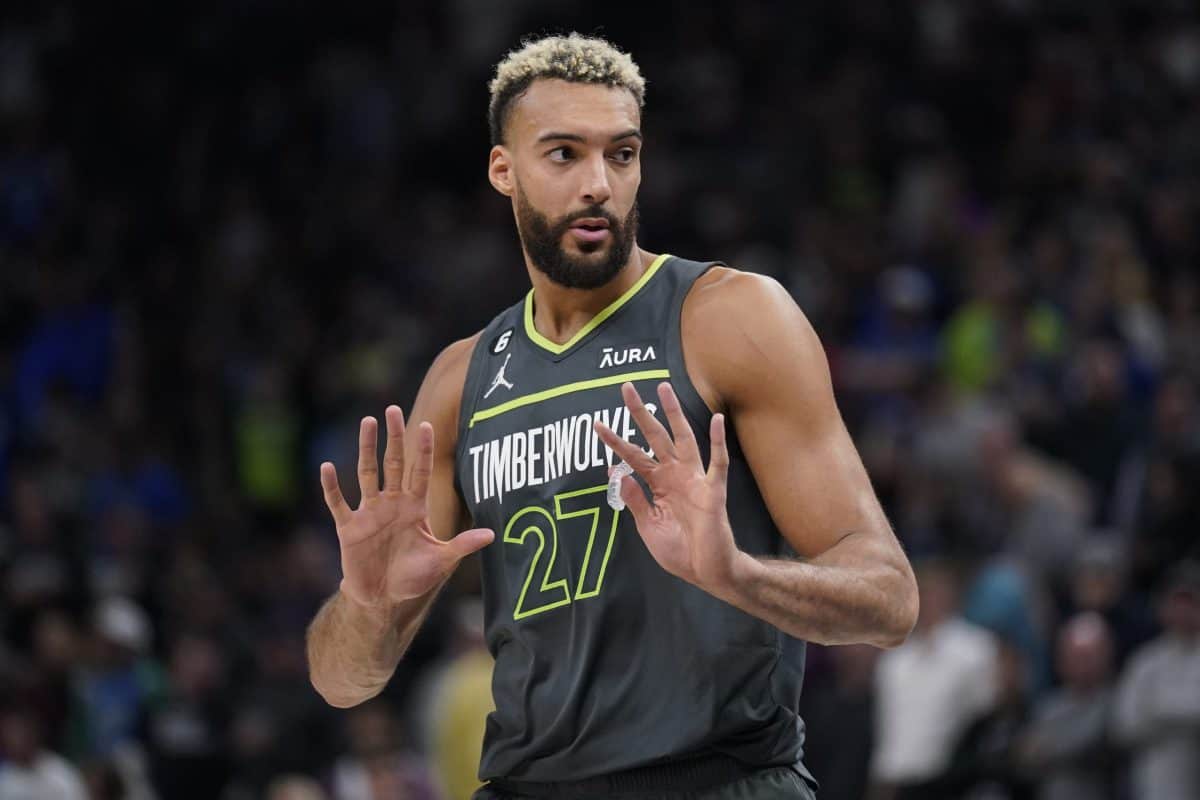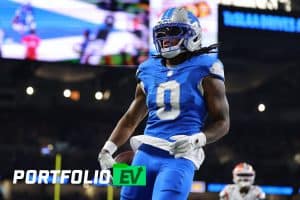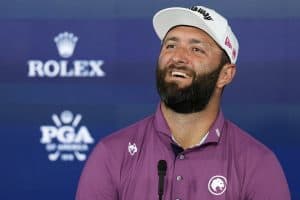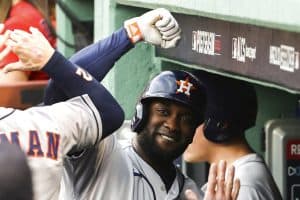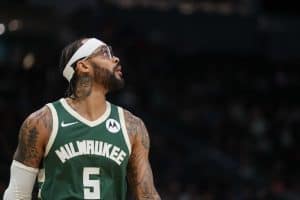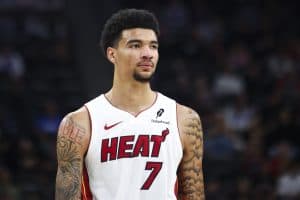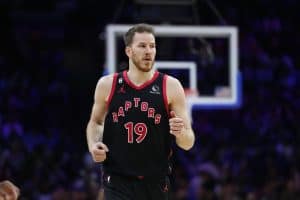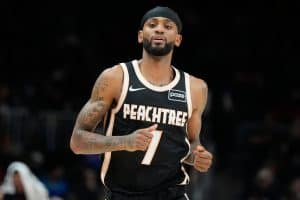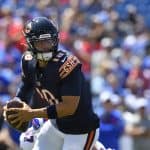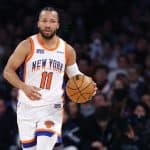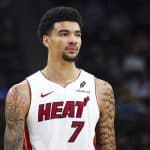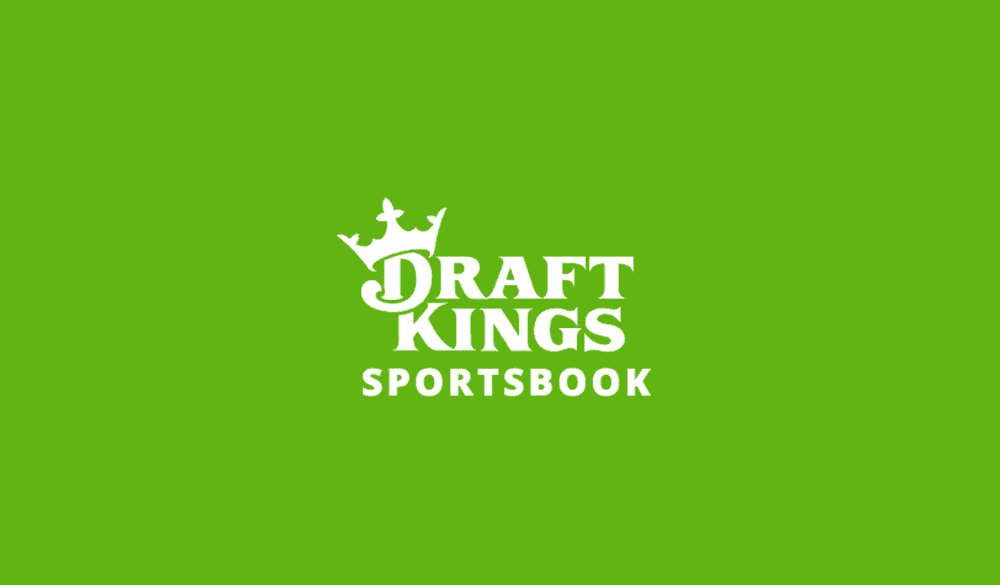While NCAA men’s basketball tournament produces plenty of highlights, it’s a lot easier to forgive great that don’t win the title — or good teams that get out to big early leads — because of its singular-elimination nature. The same isn’t true in the NBA. Great teams shouldn’t lose multi-game playoff series against bad ones. Teams that go up by 3-1 shouldn’t fumble their massive series leads. Let’s dive into the list of the biggest NBA playoff collapses of all time, an especially relevant subject as the Minnesota Timberwolves have blown a 2-0 series lead over the Denver Nuggets by losing three straight games, including games on their home floor.
Biggest NBA Playoff Collapses: Will the Timberwolves Join the List?
T5. 1993-94 New York Knicks | Biggest NBA Playoff Collapses of All Time
When Michael Jordan left the NBA after the 1992-93 season, he opened the door for a number of teams to finally score an NBA Finals victory. The New York Knicks, who were (and still are) hunting for their first title since the 1972-73 season, were expected the seize that opening. They were trading as +200 to win the title in the preseason.
At first, the Knicks capitalized on the opening, finishing as the No. 1 seed in the Eastern Conference. It wasn’t easy — they had to win seven-game series against the Chicago Bulls and the Indiana Pacers, but they made it.
Once in the Finals, the Knicks dropped Games 1 and 3, and while they did go on to win Games 4 and 5 to retake the series lead, the Rockets took Game 6 to force a Game 7. They did so thanks to a game-saving block of John Starks by Hakeem Olajuwon.
Game 7 saw one of the worst individual performances on this list: Starks, fresh off his blocked game-winner, shot 0-for-11 from deep (despite shooting 33.5% in the regular season and 35.6% in the postseason) on his way to seven points.
The Knicks would go on to lose head coach Pat Riley after the next season. They have made just one NBA Finals appearance (1998-99) following Starks’ brutal end-of-series performance, and Patrick Ewing would end his Hall of Fame career without a ring.
T5. 2020-21 Philadelphia 76ers
I’m putting the Philadelphia 76ers this high on the list because their collapse to the Atlanta Hawks could go down as a career-defining moment for Joel Embiid. If the superstar center never wins it all, the 2020-21 campaign could be viewed as a crucial turning point. It also functionally ended the career of Ben Simmons:
Passing up a wide-open dunk for a dump-off to Matisse Thybulle ended a brutal series for the player who was once seen as a budding star alongside Embiid. It forced the 76ers to trade him for James Harden, which, several years later, we know didn’t work out.
While the 76ers weren’t seen as championship favorites (or, really, contenders) before the start of the 2020-21 campaign, as they opened at odds of +2000, they lost a second-round playoff series to the Atlanta Hawks, who were +10000 before that season.
It’s not like the Hawks went on to be world-beaters, either — they haven’t even made it past the first round since then. Sure, it’s possible that Philadelphia would’ve gone on to lose to the Milwaukee Bucks or Phoenix Suns, but neither the Bucks (+550) nor the Suns (+4000) were all that great. The 2020-21 NBA Finals could’ve been the best chance for the Trust the Process 76ers, and if Embiid never wins a ring, we’ll look back at this series with a more critical eye.
4. 2010-11 Miami Heat
When LeBron James announced that he was taking his talents to South Beach, the Heat immediately became the favorites to win the NBA Finals that year. They were +175 to win the title and put together a dominant 58-24 regular-season record. They went on to score 4-1 series wins over the Philadelphia 76ers, Boston Celtics and Chicago Bulls to set up an NBA Finals matchup with the Dallas Mavericks.
Unlike the Heat, the Mavericks weren’t seen as a title contender. Sure, Dirk Nowitzki is good, but their next-best scorers, Jason Terry and Caron Butler, don’t shine a light to that Miami team’s second and third options, Dwayne Wade and Chris Bosh. The Mavs were +2000 to win the title before the season started.
The Heat took Game 1 of the NBA Finals at home before narrowly losing Game 2. They reclaimed home-court advantage with a Game 3 win, too, but proceeded to lose the next three games in a row to give the Mavericks a 4-2 series win.
James, who had told the press the Heat would win “not two, not three, not four, not five, not six, not seven…” championships, will forever have his resume stained by this postseason implosion.
Sure, James ended up being correct about the Heat going on to win the title with him on the roster. They went back-to-back in 2011-12 and 2012-13 before losing the San Antonio Spurs in 2013-14, which brought James’ time in Miami to a close. While it was still a good run, it could’ve been better, and it doesn’t help his case in the GOAT conversation.
3. 2019-20 Los Angeles Clippers
Up next is the second of two series (three if you count our honorable mentions) coached by Doc Rivers on this list. It looked like the 2019-20 Los Angeles Clippers had a real shot to secure the franchise’s first ever NBA Finals win — they had just brought in superstar wings Kawhi Leonard and Paul George and were trading at +425 to win the title before the season started. Then, the COVID-19 pandemic delayed the season, but the Clippers went a solid 5-3 in the bubble.

Everything went according to plan at first. The Clippers went 49-23 in the regular season, which was good enough for the No. 2 seed in the Western Conference. Montrezl Harrell won Sixth Man of the Year, edging out teammate Lou Williams. The Clippers even scored a 4-2 first-round win over the Dallas Mavericks to get the playoffs started.
The Clippers entered their second-round series against the Denver Nuggets with high hopes. The Nuggets were trading at +2000 to win the title that preseason, so while they were good, they weren’t great. Unsurprisingly, they quickly surrendered a 3-1 series lead to the Clippers.
In Game 5, Doc Rivers’ team got out to a 56-44 halftime lead over the Nuggets at home. After the third, it was 80-73. Then the Nuggets went on a dominant fourth quarter run to win 111-105.
But no biggie — two more games, right? Well, Game 6 saw the Clippers get out to 63-47 halftime lead, which they squandered to lose 111-98. They again led at halftime of Game 7 before losing 104-89. L.A. averaged 19.7 points per fourth quarter in the collapse.
Although Leonard and George (as of this writing — George is set to become an unrestricted free agent) are still on the Clippers, this may go down as their best chance to have won it all. The 2020-21 postseason saw Leonard suffer an injury that kept him out for the rest of the playoffs and all of 2021-22. The Clips went on to suffer first-round exits in 2022-23 and 2023-24 as age caught up to their superstars.
2. 2015-16 Oklahoma City Thunder
The Oklahoma City Thunder may be contenders now, but their 2015-16 season began a streak of seven-straight seasons in which they failed to make the second round of the NBA playoffs, largely due to the departure of Kevin Durant. But it didn’t have to go that way — the Thunder got out to a 3-1 series leader over the Golden State Warriors in the Western Conference Finals that year.
That year, the Thunder opened the season at +750 to win the NBA Finals, slightly worse than the Warriors (+480), the team that would ultimately knock them out, and the Cavaliers (+280), the team that would win the title. Their two-man combo of Durant and Russell Westbrook had combined for 51.7 points, 16 rebounds and 15.4 assists per game in the regular season, and they began the playoffs with a 4-1 series win over the Dallas Mavericks and a 4-2 win over the San Antonio Spurs.
They kept that momentum up by getting out to that 3-1 lead over the Dubs. They then lost Game 5 on the road, 120-111, after trailing from the first quarter onward. But the series went back to Oklahoma for Game 6, and the Thunder led 53-48 at halftime and 83-75 after the third quarter. However, the Warriors would win 108-101 after OKC scored just 18 points in the fourth. The Thunder again led after halftime of Game 7, but their six-point lead was no match for a vintage third-quarter performance from the Dubs, who won the frame by a whopping 17 points.
Honorable Mentions | Biggest NBA Playoff Collapses of All Time
2017-18 Houston Rockets: Shooting 0-for-27 from deep in a Game 7 cost the Rockets their best shot a title since Olajuwon. They were the first team to miss our list of the biggest NBA playoff collapses of all time.
1993-94 Seattle Supersonics: The Sonics became the first No. 1 seed to fall to a No. 8 seed, earning them a spot on this list.
2002-03 Orlando Magic: The Shaq era came to an end in Orlando with a 3-1 collapse by head coach Doc Rivers, the first of many in his coaching career.
*2023-24 Minnesota Timberwolves:* Unless Minnesota can dig out of a 3-2 hole, they’ll end up as an honorable mention on this list of the biggest NBA playoff collapses of all time for squandering a 2-0 lead as the series returned to Minnesota — especially after they won Game 2 by 26 points despite missing Rudy Gobert.
Biggest NBA Playoff Collapse of All Time: 2015-16 Golden State Warriors
No NBA team had ever won 73 games until the Golden State Warriors did it in 2015-16. No team had ever won 24 straight games to start a regular season until the Dubs did it that year, too. After their comeback win over the Oklahoma City Thunder in the Western Conference Finals, the Warriors opened the NBA Finals against the Cleveland Cavaliers as a -210 (67.7%) favorite. They proceeded to win Games 1 and 2, at which point they were -1000 (90.9%). Their Game 3 loss and Game 4 win brought them up to -2500 (96.2%).
Then came the biggest comeback in NBA Finals history. In Game 5, LeBron James and Kyrie Irving combined for 82 points to beat the Warriors in Oakland, 112-97, in what was a tie game at the half. Cleveland’s home Game 6 was never competitive, as the Cavs led 31-11 after the first quarter, and the series returned to Oakland. The Warriors were a -215 (68.3%) favorite heading into the final game.
In Game 7, Golden State got out to a 49-42 lead at the half. Cleveland closed it to 76-75 at the end of the third. It was a back-and-forth frame, and, with 4:39 left in the contest, Klay Thompson tied it at 89-89 with an assisted layup.
But the Warriors would not score another point: Stephen Curry (0-for-4), Andre Iguodala (0-for-2), Klay Thompson (0-for-1), Draymond Green (0-for-1) and Marreese Speights (0-for-1) all failed to make a single field goal. The Cavs won thanks to an Irving 3-pointer with 53 seconds to go and a James free throw with 11 remaining, giving the record-setting 2015-16 Warriors another record by making them the first to blow a 3-1 lead in the NBA Finals, which is why they’re number one on our list of the biggest NBA playoff collapses of all time.
OddsShopper’s NBA Tools & Tips
Looking for more 2023-24 NBA predictions? OddsShopper’s experts are here to break down this NBA season — make sure to check out the rest of our NBA articles. Still need more picks? Subscribe to OddsShopper Premium for our market-based betting model’s picks and best bets.
